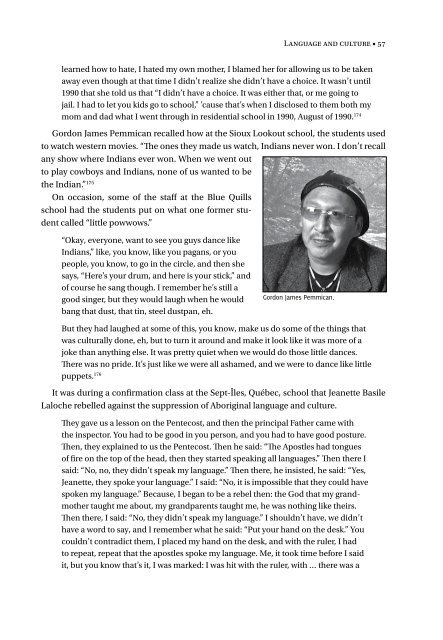The Survivors Speak
1MB8J05
1MB8J05
Create successful ePaper yourself
Turn your PDF publications into a flip-book with our unique Google optimized e-Paper software.
Language and culture • 57<br />
learned how to hate, I hated my own mother, I blamed her for allowing us to be taken<br />
away even though at that time I didn’t realize she didn’t have a choice. It wasn’t until<br />
1990 that she told us that “I didn’t have a choice. It was either that, or me going to<br />
jail. I had to let you kids go to school,” ’cause that’s when I disclosed to them both my<br />
mom and dad what I went through in residential school in 1990, August of 1990. 174<br />
Gordon James Pemmican recalled how at the Sioux Lookout school, the students used<br />
to watch western movies. “<strong>The</strong> ones they made us watch, Indians never won. I don’t recall<br />
any show where Indians ever won. When we went out<br />
to play cowboys and Indians, none of us wanted to be<br />
the Indian.” 175<br />
On occasion, some of the staff at the Blue Quills<br />
school had the students put on what one former student<br />
called “little powwows.”<br />
“Okay, everyone, want to see you guys dance like<br />
Indians,” like, you know, like you pagans, or you<br />
people, you know, to go in the circle, and then she<br />
says, “Here’s your drum, and here is your stick,” and<br />
of course he sang though. I remember he’s still a<br />
good singer, but they would laugh when he would<br />
bang that dust, that tin, steel dustpan, eh.<br />
Gordon James Pemmican.<br />
But they had laughed at some of this, you know, make us do some of the things that<br />
was culturally done, eh, but to turn it around and make it look like it was more of a<br />
joke than anything else. It was pretty quiet when we would do those little dances.<br />
<strong>The</strong>re was no pride. It’s just like we were all ashamed, and we were to dance like little<br />
puppets. 176<br />
It was during a confirmation class at the Sept-Îles, Québec, school that Jeanette Basile<br />
Laloche rebelled against the suppression of Aboriginal language and culture.<br />
<strong>The</strong>y gave us a lesson on the Pentecost, and then the principal Father came with<br />
the inspector. You had to be good in you person, and you had to have good posture.<br />
<strong>The</strong>n, they explained to us the Pentecost. <strong>The</strong>n he said: “<strong>The</strong> Apostles had tongues<br />
of fire on the top of the head, then they started speaking all languages.” <strong>The</strong>n there I<br />
said: “No, no, they didn’t speak my language.” <strong>The</strong>n there, he insisted, he said: “Yes,<br />
Jeanette, they spoke your language.” I said: “No, it is impossible that they could have<br />
spoken my language.” Because, I began to be a rebel then: the God that my grandmother<br />
taught me about, my grandparents taught me, he was nothing like theirs.<br />
<strong>The</strong>n there, I said: “No, they didn’t speak my language.” I shouldn’t have, we didn’t<br />
have a word to say, and I remember what he said: “Put your hand on the desk.” You<br />
couldn’t contradict them, I placed my hand on the desk, and with the ruler, I had<br />
to repeat, repeat that the apostles spoke my language. Me, it took time before I said<br />
it, but you know that’s it, I was marked: I was hit with the ruler, with … there was a


